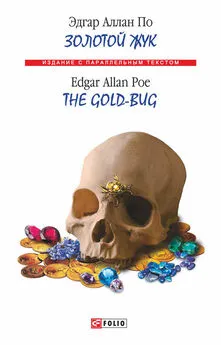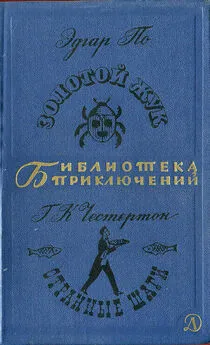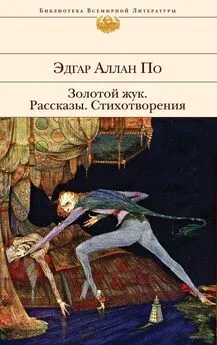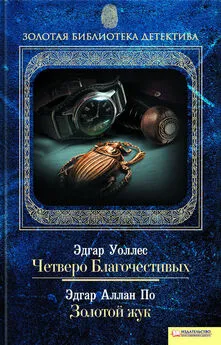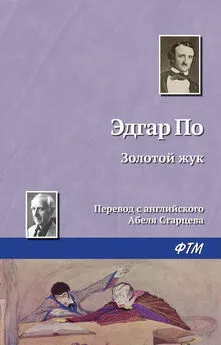Эдгар По - Золотой жук / The Gold-bug (сборник)
- Название:Золотой жук / The Gold-bug (сборник)
- Автор:
- Жанр:
- Издательство:Литагент Фолио
- Год:2017
- Город:Харьков
- ISBN:978-966-03-5792-1, 978-966-03-7010-4
- Рейтинг:
- Избранное:Добавить в избранное
-
Отзывы:
-
Ваша оценка:
Эдгар По - Золотой жук / The Gold-bug (сборник) краткое содержание
Золотой жук / The Gold-bug (сборник) - читать онлайн бесплатно ознакомительный отрывок
Интервал:
Закладка:
«Yes; asleep now. Do not wake me! – let me die so!»
I here felt the limbs and found them as rigid as ever. The right arm, as before, obeyed the direction of my hand. I questioned the sleep-waker again —
«Do you still feel pain in the breast, M. Valdemar?»
The answer now was immediate, but even less audible than before —
«No pain – I am dying.»
I did not think it advisable to disturb him further just then, and nothing more was said or done until the arrival of Dr. F —, who came a little before sunrise, and expressed unbounded astonishment at finding the patient still alive. After feeling the pulse and applying a mirror to the lips, he requested me to speak to the sleep-waker again. I did so, saying —
«M. Valdemar, do you still sleep?»
As before, some minutes elapsed ere a reply was made; and during the interval the dying man seemed to be collecting his energies to speak. At my fourth repetition of the question, he said very faintly, almost inaudibly —
«Yes; still asleep – dying.»
It was now the opinion, or rather the wish, of the physicians, that M. Valdemar should be suffered to remain undisturbed in his present apparently tranquil condition, until death should supervene – and this, it was generally agreed, must now take place within a few minutes. I concluded, however, to speak to him once more, and merely repeated my previous question.
While I spoke, there came a marked change over the countenance of the sleep-waker. The eyes rolled themselves slowly open, the pupils disappearing upwardly; the skin generally assumed a cadaverous hue, resembling not so much parchment as white paper; and the circular hectic spots which, hitherto, had been strongly denned in the centre of each cheek, went out at once. I use this expression, because the suddenness of their departure put me in mind of nothing so much as the extinguishment of a candle by a puff of the breath. The upper lip, at the same time, writhed itself away from the teeth, which it had previously covered completely; while the lower jaw fell with an audible jerk, leaving the mouth widely extended, and disclosing in full view the swollen and blackened tongue. I presume that no member of the party then present had been unaccustomed to death-bed horrors; but so hideous beyond conception was the appearance of M. Valdemar at this moment, that there was a general shrinking back from the region of the bed.
I now feel that I have reached a point of this narrative at which every reader will be startled into positive disbelief. It is my business, however, simply to proceed.
There was no longer the faintest sign of vitality in M. Valdemar; and concluding him to be dead, we were consigning him to the charge of the nurses, when a strong vibratory motion was observable in the tongue. This continued for perhaps a minute. At the expiration of this period, there issued from the distended and motionless jaws a voice – such as it would be madness in me to attempt describing. There are, indeed, two or three epithets which might be considered as applicable to it in part; I might say, for example, that the sound was harsh, and broken, and hollow; but the hideous whole is indescribable, for the simple reason that no similar sounds have ever jarred upon the ear of humanity. There were two particulars, nevertheless, which I thought then, and still think, might fairly be stated as characteristic of the intonation – as well adapted to convey some idea of its unearthly peculiarity. In the first place, the voice seemed to reach our ears – at least mine – from a vast distance, or from some deep cavern within the earth. In the second place, it impressed me (I fear, indeed, that it will be impossible to make myself comprehended) as gelatinous or glutinous matters impress the sense of touch.
I have spoken both of «sound» and of «voice.» I mean to say that the sound was one of distinct – of even wonderfully, thrillingly distinct – syllabification. M. Valdemar spoke – obviously in reply to the question I had propounded to him a few minutes before. I had asked him, it will be remembered, if he still slept. He now said —
«Yes – no – I have been sleeping – and now – now – I am dead.»
No person present even affected to deny, or at tempted to repress, the unutterable, shuddering horror which these few words, thus uttered, were so well calculated to convey. Mr. L – l (the student) swooned. The nurses immediately left the chamber, and could not be induced to return. My own impressions I would not pretend to render intelligible to the reader. For nearly an hour, we busied ourselves, silently – without the utterance of a word – in endeavours to revive Mr. L – l. When he came to himself, we addressed ourselves again to an investigation of M. Valdemar’s condition.
It remained in all respects as I have last described it, with the exception that the mirror no longer afforded evidence of respiration. An attempt to draw blood from the arm failed. I should mention, too, that this limb was no further subject to my will. I endeavoured in vain to make it follow the direction of my hand. The only real indication, indeed, of the mesmeric influence was now found in the vibratory movement of the tongue, whenever I addressed M. Valdemar a question. He seemed to be making an effort to reply, but had no longer sufficient volition. To queries put to him by any other person than myself he seemed utterly insensible – although I endeavoured to place each member of the company in mesmeric rapport with him. I believe that I have now related all that is necessary to an understanding of the sleep-waker’s state at this epoch. Other nurses were procured; and at ten o’clock I left the house in company with the two physicians and Mr. L – l.
In the afternoon we all called again to see the patient. His condition remained precisely the same. We had now some discussion as to the propriety and feasibility of awakening him; but we had little difficulty in agreeing that no good purpose would be served by so doing. It was evident that, so far, death (or what is usually termed death) had been arrested by the mesmeric process. It seemed clear to us all that to awaken M. Valdemar would be merely to insure his instant, or at least his speedy dissolution.
From this period until the close of last week – an interval of nearly seven months – we continued to make daily calls at M. Valdemar’s house, accompanied, now and then, by medical and other friends. All this time the sleep-waker remained exactly as I have last described him. The nurses’ attentions were continual.
It was on Friday last that we finally resolved to make the experiment of awakening, or attempting to awaken him; and it is the (perhaps) unfortunate result of this latter experiment which has given rise to so much discussion in private circles – to so much of what I cannot help thinking unwarranted popular feeling.
For the purpose of relieving M. Valdemar from the mesmeric trance, I made use of the customary passes. These for a time were unsuccessful. The first indication of revival was afforded by a partial descent of the iris. It was observed, as especially remarkable, that this lowering of the pupil was accompanied by the profuse outflowing of a yellowish ichor (from beneath the lids) of a pungent and highly offensive odour.
It was now suggested that I should attempt to influence the patient’s arm as heretofore. I made the attempt and failed. Dr. F – then intimated a desire to have me put a question. I did so, as follows —
«M. Valdemar, can you explain to us what are your feelings or wishes now?»
There was an instant return of the hectic circles on the cheeks; the tongue quivered, or rather rolled violently in the mouth (although the jaws and lips remained rigid as before); and at length the same hideous voice which I have already described, broke forth —
«For God’s sake! – quick! – quick – put me to sleep – or quick! – waken me! – quick! – I say to you that I am dead!»
I was thoroughly unnerved, and for an instant remained undecided what to do. At first I made an endeavour to re-compose the patient; but, failing in this through total abeyance of the will, I retraced my steps, and as earnestly struggled to awaken him. In this attempt I soon saw that I should be successful – or at least I soon fancied that my success would be complete – and I am sure that all in the room were prepared to see the patient awaken.
For what really occurred, however, it is quite impossible that any human being could have been prepared.
As I rapidly made the mesmeric passes, amid ejaculations of «Dead! dead!» absolutely bursting from the tongue and not from the lips of the sufferer, his whole frame at once – within the space of a single minute, or even less, shrunk – crumbled – absolutely rotted away beneath my hands. Upon the bed, before that whole company, there lay a nearly liquid mass of loathsome – of detestable putrescence.
Что случилось с господином Вальдемаром
Я ничуть не удивляюсь тому, что необычайное происшествие с господином Вальдемаром наделало столько шума. Было бы чудом, если бы этого не случилось – особенно при данных обстоятельствах. Несмотря на желание всех заинтересованных лиц скрыть это дело от публики, по крайней мере на время, до более обстоятельного исследования, несмотря на все наши старания в этом смысле, искаженные или преувеличенные слухи о нем распространились и послужили источником разных нелепостей и в то же время, естественно, возбудили недоверие.
Это обстоятельство заставляет меня сообщить факты в том виде, насколько они известны мне самому. Вот они вкратце.
В последние три года я много занимался месмеризмом, а месяцев девять тому назад мне совершенно неожиданно пришло в голову, что в массе опытов, проводившихся до недавна, есть поразительное и непонятное упущение: до сих пор никто не был месмеризован in articulo mortis [1] В состоянии агонии ( лат ).
. Интересно было бы узнать, во-первых, доступен ли такой пациент месмерическому влиянию; во-вторых, если доступен, то усиливается ли оно или ослабляется при данных условиях; в-третьих, до какой степени и как долго разрушительная деятельность смерти может быть задержана месмерическим состоянием? Можно было бы выяснить и различные другие вопросы, но вышеперечисленные особенно интересовали меня; главным образом последний – ввиду его важного значения.
Раздумывая, где бы найти подходящего пациента, я вспомнил о своем приятеле, мистере Вальдемаре, известном составителе компиляций для «Bibliotheca Forensica» [2] Судебная библиотека ( лат. ).
и переводчике (под псевдонимом Иссахара Маркса) «Валленштейна» и «Гаргантюа». Господин Вальдемар, проживавший с 1839 года главным образом в Гарлеме, штат Нью-Йорк, замечателен (точнее, был замечателен) своей крайней худобой – ноги у него не толще, чем у Джона Рандольфа. Другая замечательная особенность его наружности – совершенно седые, белые усы, представлявшие резкий контраст с черными как смоль волосами, из-за чего многие думали, что он носит парик.
Интервал:
Закладка:
